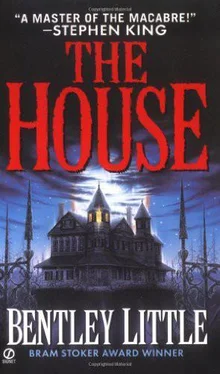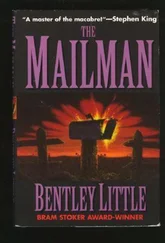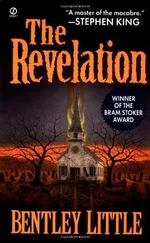Feigning a bravery he did not feel, he turned his back on the assistant and walked across the sitting room, pulling open the drapes covering the window. He tried peering out, but it was night outside and he could see nothing.
"I should be able to see the lights of Dry River,"
he said.
"Curious, isn't it?"
Mark dropped the drapes. "What's going on here?" he demanded.
Billings chuckled.
"Who are you?"
"You know who I am, Marky boy."
Mark felt cold. "All right, then. What are you?"
"I'm the assistant."
"What do you want from me?"
"Me? Nothing. It's the House that called you back."
"Called me back?"
"You are to live here again."
Mark shook his head. "I don't know what the fuck you're talking about, but I came back here because Kris ten died and I wanted to find out what happened to her.
And for your information, I came back for a visit, not to stay."
"But stay you shall. The House needs occupants."
"For what?"
"Why, to maintain the border, of course."
Mark didn't like the sound of that, and he tried not to let his fear show.
"The House," Billings continued, "was built as a barrier, to maintain the border between this world, the material world, and the other world, the Other Side."
Mark's mouth felt dry. "The 'Other Side'?"
Billings's eyes were flat, unreadable. "The hereafter, the world of the dead, the world of magic and the supernatural, the world of spirits. It is the opposite of this world, your world, and it is a horrific place, a world of terrors and abominations the likes of which you have never seen nor ever dreamed. The House was built to keep the two separate, and it is the only reason your people, your world, are still here. Otherwise, you would have been overrun long ago."
Mark said nothing.
"The House is like an electrified fence or, more precisely, like a battery supplying power to that fence. And it is charged by people living within it. That is why you were called back. For the first time, the House is empty.
There is no one living here, and the barriers are coming down. On both sides." He looked at Mark. "Ever since Kristen passed on."
Mark turned away, didn't respond. His heart was pumping crazily, and his body was drenched with a sheen of fear sweat.
"The border is asemipervious membrane. It is not a solid wall, and without a strong barrier to separate the two worlds, they will inevitably collide. And that," he said, "would be catastrophic."
"So I'm here to recharge the battery?"
"If you will."
"What happens if I refuse?"
"You have not refused. You have come."
"What if I leave?"
"You can't leave."
"Who's going to stop me if I break one of these windows and jump out and run away?"
Billings looked at him. "The House."
There was silence between them after that.
"Where did the house come from?" Mark asked finally.
"Who built it?"
"The Ones Who Went Before."
The name, with its ambiguity and intimations of tremendous age, frightened him, and he listened quietly as Mr. Billings described the early days, after the barrier was erected, the days of miracles, when gods and monsters roamed the earth, when seas were parted, when oracles foretold the future, when miraculous beings and the resurrected dead mingled with ordinary men. After the House became occupied, he explained, as it gained strength and became more efficient, more attuned to its purpose, those "leaks" were plugged, all access to the Other Side was sealed off.
"Nothing is perfect," the assistant said. "And, in the past, isolated spirits have made it through. But the House was built to maintain the laws of reason and rationality, and those exceptions had no influence or bearing upon that purpose. The Other Side was eventually forgotten about, passing into the realm of myth and fiction, and the occasionally sighted monster, the occasional haunted house, the occasional ghost became an aberration, entertainment, a story that was interesting but not to be believed.
"Now, however, the House is failing. Elements of the other world are breaking through to this world, the material world, and elements of your world are breaking into it."
Mark desperately wanted a drink. "How long have you been here?" he asked. "In the House?"
"I have always been here."
He didn't like that answer.
"What about your daughter?"
The assistant frowned. "What?"
"Is she still here?" He saw in his mind the child's sly corrupt face, and he shivered even as he acknowledged the faint sensual stirring within him.
Billings blinked, puzzled, and an expression closely related to fear crossed his features.
"I have no daughter," he said.
Norton For the first time since he'd arrived, for the first time in his memory,Billingson appeared to be rattled, and Norton felt a small twinge of satisfaction. It was petty, he knew, and should have been beneath him, but the hired hand's discomfort made him feel good.
At the same time, he was terrified.
He didn't know what he'd expected to find here when he returned. A haunted house? Yes. Ghosts from his past? Yes. But not this wide-ranging, elaborate, epic situation.
Did he believe it?
There was no doubt in his mind that the hired hand spoke the truth. Nothing else made sense. But the story was so all-inclusive as to be completely overwhelming.
A demon possessed a peasant in Bangladesh, or a hiker in the Himalayas caught a glimpse of the abominable snowman, and it was because he didn't live in the Oak dale house anymore? Such a causal connection seemed on the face of it impossible, butBillingson's simple explanation tied it all together in a way that seemed to him entirely believable.
And what about the girl?
As happy as he was to seeBillingson so shaken, it frightened him to realize that the hired hand knew nothing about the child who was supposed to have been his daughter.
Donna.
He felt a stirring in his groin just thinking about her.
But the fact thatBillingson , who seemed to know everything, who seemed to be at the center of all that was going on, was completely unaware of the girl's existence disturbed him in a way he could not explain. As terrifying as the House was, there seemed to be a logic to it, a coherent theory or controlling power behind it. But the girl existed outside of that. She was a wild card, and her existence threw everything off balance, darkening and complicating an already dark and complex picture.
The conversation, the lecture, had been derailed by the revelation that he had seenBillingson's daughter, but the hired hand, while clearly shaken, faced Norton calmly, once again perfectly composed, and said, "It's getting late. I think we should finish this discussion in the morning."
Norton glanced around the sitting room. Until this point, his time in the House had been spent in the sitting room, like a variation of No Exit, and his first thought was that he was going to have to sleep here--on the couch or the love seat or the chairs or the floor--and was never going to be able to leave the room.
But when he asked, "Where am I going to sleep?"
Billingsonreplied, "Your room is waiting for you."
Indeed, his bedroom was exactly where it had always been: halfway down the third-story hall. There were numerous doors lining both sides of the dark corridor and Norton realized that even as a child he had never known what was in most of those other rooms. Their doors had always been closed or locked, and he had never even wondered what was inside them.
There are other dimensions besides space and time.
It was whatBillingson had said when quizzed about the exact placement of the Housevis-a-vis the "Other Side," and though Norton had said nothing at the time, the statement had frightened him and stuck with him.
Читать дальше












